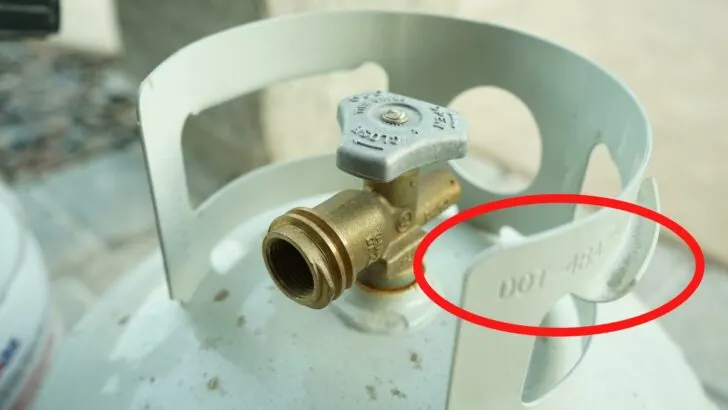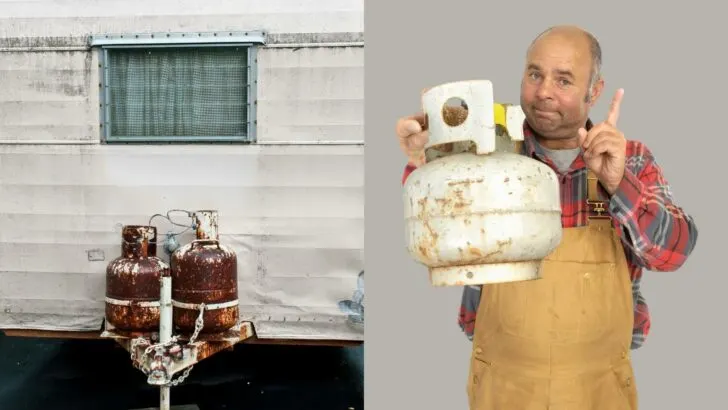As fall rolls along and some RVers are thinking about winterizing and storing their rigs for the winter, we thought this would be a good time to address the question, “Does propane go bad?”
We’ve previously investigated gasoline and diesel in our posts entitled “Does Gasoline Go Bad?” and “Does Diesel Go Bad?” But we’ve never written a post about the shelf life of propane.
Does propane have an expiration date? Are there certain things we need to do to store propane safely?
Let’s find out!
Why Is It Important to Know If Propane Goes Bad?
Not only do some RVers store their rigs for the winter (often with partially full propane tanks), but lots of people store partially full portable propane gas tanks used for summer barbequeing.
Many RVers rely on propane for heating, cooking, and hot water. As the fall nights get chilly, some are getting ready to bring out their portable propane-powered heaters for winter camping. But, they’ve been stored away for a long time.
For all of these people, it’s important to know whether propane degrades over time. More important, however, is whether a stored propane tank presents a risk. Can propane tanks explode in the cold, for example?
These are important questions to know the answers to before you store a propane tank of any kind.
OK, So… Does Propane Go Bad?
The answer is no. Propane doesn’t go bad – it does not expire. In fact, this is an advantage that propane has over other fuel sources.
Propane, (LPG or liquefied petroleum gas), is a component of natural gas that is compressed and stored as a liquid. And, it has a very long shelf life.
Why Does a Propane Tank or Gauge Have an Expiration Date?
When you see an expiration date on a propane tank or gauge, what you’re actually seeing is the date when the tank’s safety inspection expires. Essentially, the date on the tank is a reminder to get the tank itself inspected because it’s the tank that needs to be replaced – not the propane.
In the United States, PORTABLE propane tanks/cylinders with a capacity of 100 pounds or less will have an expiration date 12 years out from the manufacturing date, as required by the DOT standard they are certified to. (They have a 10-year expiry in Canada.)
You should see the date stamped on the collar of a portable cylinder in a month/year format. (Example, 09/22 for September of 2022.)

On portable propane cylinders, DOT information including the expiration date of the TANK is stamped on the collar of the tank.
After that date, you’ll need to have the tank inspected to determine if it needs to be replaced or requalified/recertified. Requalified/recertified tanks will receive a new expiration date of 5, 7, or 12 years out, depending on the type of recertification and the method.
Brand new, larger, BUILT-IN RV propane tanks are manufactured with thicker walls and are certified by ASME (just like permanently installed propane cylinders for residential use), not the DOT, and don’t need to be recertified. However, it’s still a good to check regularly them for signs of rust and leaks.
Can Propane Tanks Explode?
Propane tanks can rust and leak. Since a gas leak is never a good thing, it’s important to prevent rust and to monitor tanks for the development of rust. It’s also why propane tanks have an “expiry” date – a reminder that it’s time to get the tank inspected.
As for the potential to explode, there are a few things that are important to know.
First, propane tanks rarely explode, but it CAN happen under extreme circumstances.
There are safety mechanisms built into propane tanks. As long as you maintain your tanks and respect the propane as you use it, your propane tank exploding (or imploding) is highly unlikely.
One of the most important things you can do is to avoid leaks. This includes maintaining your propane tank and having it regularly inspected.
Leaks can develop around valves, of course, but if rust penetrates the tank, you’ve got a real problem on your hands. The important thing is to make sure your tank never gets to that point!

Propane tanks need to be kept rust-free and should be replaced (or recertified) by their expiration date.
It’s also important to make sure that a propane tank isn’t exposed to extreme heat for long periods of time. If temperatures outside the tank are so high that they cause the temperature inside to rise excessively, the tank can explode if the built-in safety release systems fail.
However, this is an unusual situation and would require the liquid propane inside a faulty tank to come to a boil and expand. That expansion could cause the tank to explode. For this to happen, your tank would need to be stored in a place with temperatures of 120℉ or higher for an extended period.
How to Store a Propane Tank Safely
There are a few things you can do to be sure your propane tank is safe:
- It’s always best to store a propane tank (or a rig with a built-in propane tank!) in a place that is cool and dry. Lower storage temperatures ensure the tank, and the LP inside it, remain at a safe, low temperature. Again, it’s best to store propane at temps below 120 degrees Fahrenheit.
- Do not store rusty propane tanks. Get the tank replaced if rust is an issue.
- When storing a propane tank (or an RV with a propane tank onboard) be sure to shut the valve off prior to storing. You don’t want a gas leak developing.
- Never store a propane tank indoors. If a gas leak were to develop, this could be very dangerous.
- Always store portable propane tanks upright on a flat surface in a cool, dry area… and monitor them for rust over time.
Can I Check the Propane Level In My Tank Without a Gauge?
Yes, you can! If you don’t have a working gauge on your propane tank, the best way to check the level of propane in the tank is actually quite simple.
We’ll let Peter show you how it’s done.
Geek Out with Us Every Week
Join our newsletter to learn about all things RV-related. Every week we offer free tips, tricks, product reviews, and more to our online community of RVers. So, whether this is your first time on the road or you’re a seasoned expert, we’d love for you to geek out with us!


Deborah Kerr
Sunday 1st of October 2023
My Dad drove a tanker truck hauling propane - a few years before he retired, his truck rolled down and overturned on an icy road here in NE Ohio (just minor injuries!!)!! Relieved that it did NOT explode or catch on fire, I feel more comfortable with a permanent propane tank in our motorhome that also runs the generator! Thank you for the informative article - knowledge is power and peace of mind!! :)
Guss
Sunday 1st of October 2023
Yes, if you have propane tanks that has expired and needs to be inspected or recertified were, can you take them to have this done?
TheRVgeeks
Tuesday 3rd of October 2023
Typically, local propane dealers are the ones who can do the recertification, so it's usually best to just do a Google search on "propane tank recertification near me" and you should find someone.
wahooncx
Monday 10th of October 2022
There is an odd tank out there. I have a couple of portable FRP tanks made by Viking/Ragasco that require 5 year inspections. You mostly see these used in a marine environment. I have a couple I use for camping because they are light weight.
Scott
Monday 10th of October 2022
Thanks great tip!
Jeffory
Tuesday 4th of October 2022
Great tip as usual!
TheRVgeeks
Tuesday 4th of October 2022
Thanks, Jeffery!